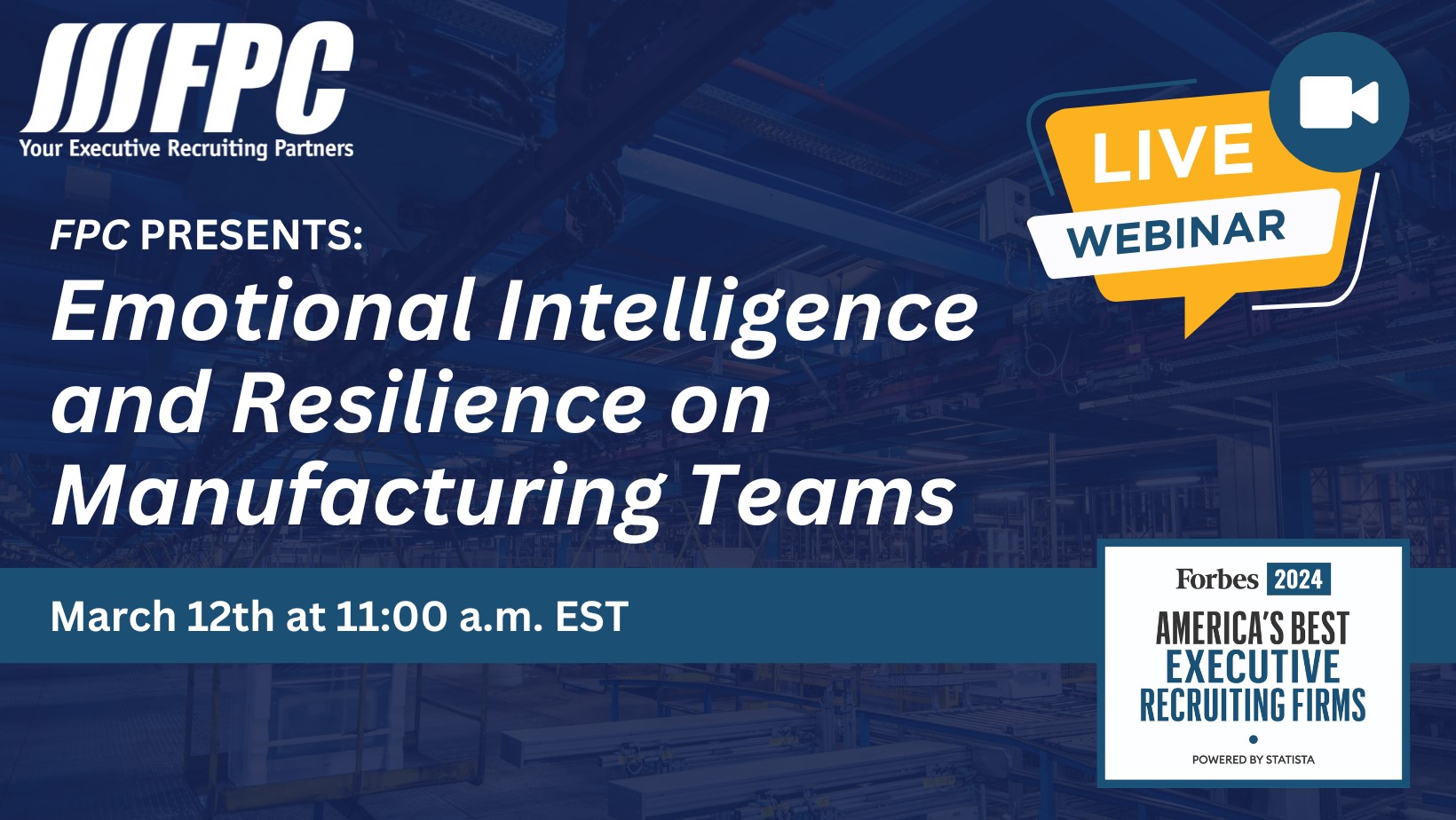The Power of Emotional Intelligence and Resilience in Manufacturing Leadership
Employers
In today’s fast-paced and ever-changing manufacturing industry, technical skills alone are not enough to drive success. The ability to adapt, communicate effectively, and lead with emotional intelligence and resilience has become just as critical. During a recent webinar hosted by FPC National, industry experts discussed how these qualities impact hiring, team performance, and overall business success.
Why Emotional Intelligence and Resilience Matter
The discussion opened with a strong emphasis on why emotional intelligence (EQ) and resilience are more than just buzzwords. Nancy Ford , PsyD, co-founder of FPC Elevate, highlighted that leaders who possess these traits can drive stronger engagement, increase retention, and build high-performing teams.
Manufacturing environments are constantly evolving, requiring leaders who can manage change, support their teams through uncertainty, and foster collaboration. A recent white paper study conducted by FPC National found that manufacturing employees who scored high in emotional intelligence and resilience reported higher job satisfaction and greater adaptability to workplace challenges.
The Role of Emotional Intelligence in Hiring
Kimberly Anders, SHRM-SCP, Director of Human Resources at Prime Technological Services, emphasized that hiring for emotional intelligence is just as important as hiring for technical skills. “We use behavioral assessments and targeted interview questions to uncover how candidates respond to challenges, handle conflict, and integrate into teams,” she shared. One effective strategy her team uses is asking candidates about past workplace conflicts:
“People will tell me they love working with others until there’s a negative interaction. I always ask, ‘What steps do you take to counteract a negative situation?’ That answer tells me everything about their mindset.”
This proactive approach helps organizations hire not just for immediate needs, but for long-term cultural and leadership fit.
The Link Between Leadership and Retention
David Alsop, CHRO of Ultradent and founder of JumpSpark, shared a compelling case study about a manufacturing division that suffered from over 50% turnover due to poor leadership. He explained that the previous leaders focused solely on accountability and performance metrics but lacked the emotional intelligence to connect with their teams.
“When we brought in a new leader who prioritized communication, trust, and team morale, regrettable turnover dropped from 50% to 20%,” Alsop revealed. “The employees who truly mattered—those who contributed to long-term success—chose to stay. And as engagement increased, so did productivity.”
His takeaway? Resilient and emotionally intelligent leaders are the foundation of high-retention, high-performance teams.
Training Leaders to Recognize and Cultivate Emotional Intelligence
Panelists also agreed that while some leaders naturally exhibit emotional intelligence, it can and should be cultivated through training and mentorship. Betsy Allen, a leadership coach and former HR executive, highlighted the importance of training hiring managers to assess emotional intelligence in interviews.
“We spend so much time prepping candidates for interviews, but companies don’t spend enough time coaching leaders on how to interview candidates effectively.”
Her recommendation? Encourage hiring managers to ask deeper follow-up questions rather than accepting surface-level answers. For example:
-
First question: Tell me about a time you faced a workplace challenge.
-
Follow-up question: How did that situation make you feel, and what did you learn from it?
-
Third-level question: If you faced the same situation today, would you handle it differently?
This technique helps uncover a candidate’s self-awareness, problem-solving approach, and capacity for growth.
Onboarding and Cultural Integration: Setting Employees Up for Success
Betsy also emphasized the importance of structured onboarding to integrate new hires successfully.
“Onboarding should extend beyond the first two weeks—it should cover the first 90 days or even the first year. Employees need a roadmap to understand company culture, expectations, and their growth potential.”
Organizations that provide clear frameworks for leadership competencies and emotional intelligence expectations see greater engagement and retention. By reinforcing these values through ongoing mentorship and one-on-one check-ins, companies create an environment where employees feel supported and valued.
Resilient Leaders Drive Business Success
One of the most compelling insights from the discussion was the direct link between resilient leadership and business outcomes. Leaders who embrace resilience foster teams that:
-
Adapt to change with confidence
-
Stay motivated despite challenges
-
Collaborate effectively and problem-solve proactively
David Alsop shared a key insight on hiring for resilience:
“When hiring, we look for candidates who have faced real adversity and come out stronger. We ask, ‘Tell me about a time you failed and how you recovered?’ If they give a polished answer right away, we push further. We want to see self-awareness, growth, and the ability to bounce back.”
Final Takeaways: Building a More Resilient Workforce
The webinar concluded with actionable steps for companies looking to integrate emotional intelligence and resilience into their hiring and leadership development strategies:
-
Redefine Hiring Priorities – Move beyond technical skills and incorporate behavioral assessments that measure EQ and resilience.
-
Train Leaders to Identify EQ in Interviews – Encourage deeper questioning and focus on a candidate’s ability to handle setbacks.
-
Create a Structured Onboarding Process – Extend onboarding beyond two weeks to ensure cultural alignment and long-term engagement.
-
Encourage Continuous Development – Invest in leadership coaching and mentorship programs that reinforce emotional intelligence.
-
Measure Success – Track turnover rates, engagement scores, and team performance to evaluate the impact of emotional intelligence initiatives.
As manufacturing continues to evolve, organizations must prioritize emotional intelligence and resilience to stay competitive. Leaders who cultivate these traits will not only build stronger teams but also drive long-term business success.
By making EQ and resilience core elements of the hiring process, training programs, and leadership development initiatives, companies can create a workplace culture where employees feel empowered, engaged, and equipped to tackle challenges head-on.

